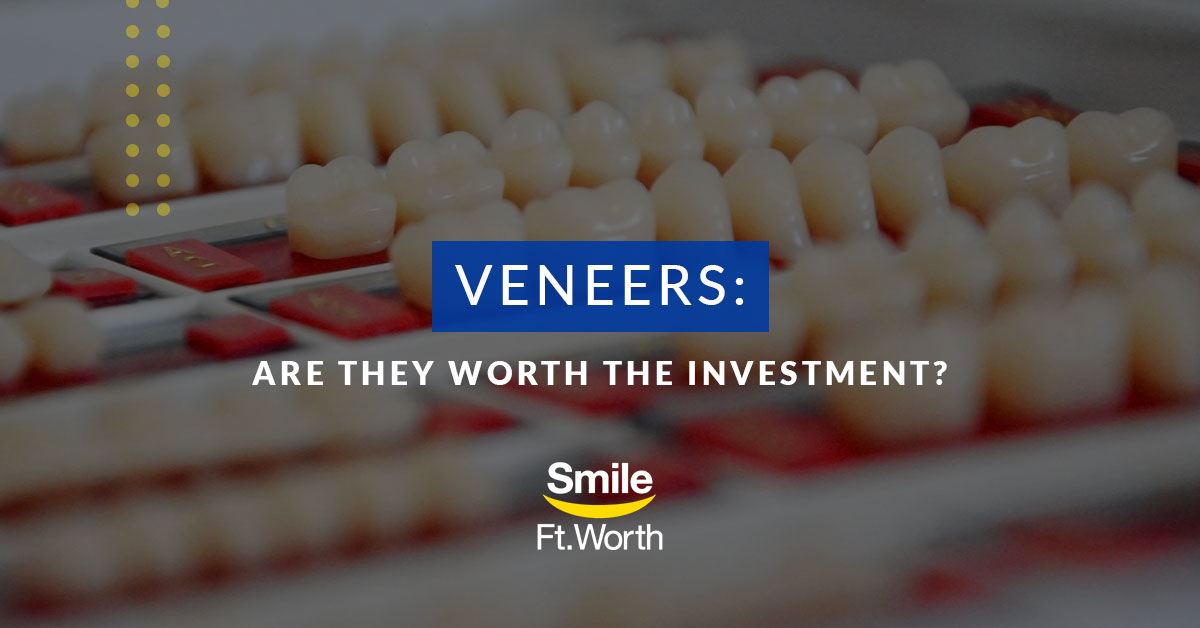Have you been considering getting veneers in Fort Worth? Maybe one too many Zoom calls made it clear that your smile was less than perfect. Or, perhaps you’ve always felt self-conscious about your teeth.
Veneers can help you upgrade your smile and your self-esteem. However, they are a serious investment, so you’ll need to ensure you have all the information you need before taking the plunge.
In this guide, we’ll give you all the basics you need to know about veneers, including costs, the pros and cons, and the different types of veneers, to help you determine if veneers are a good option for you.
What Are Veneers?
Veneers are essentially a cover that goes on your teeth, much like an acrylic nail that goes over your fingernails. Veneers are ultra-thin shells that are bonded to your teeth in order to transform their size, color, length, or shape. They are purely for cosmetic purposes, designed to improve a person’s smile and self-confidence.
Veneers can fix minor orthodontic problems like:
- Gapped teeth
- Crooked teeth
- Discolored teeth
- Broken teeth (small chips)
- Worn-down teeth
- Irregularly sized teeth
How Much do Veneers Usually Cost?
The cost of veneers varies depending on the dentist, the number of teeth you want to fix, and the type of veneer used. According to the Consumer Guide to Dentistry, the cost of porcelain veneers ranges from $925 to $2,500 per tooth (four to eight are usually required for a makeover).
For those wanting to fix a few imperfect teeth, the costs will be lower.
It always pays to shop around and find a dentist’s office where you feel comfortable and that has experienced practitioners with results of their past work readily available. Before making the appointment, ask to see before and after pictures. The best cosmetic dentists use customized colors and shapes to blend the veneers naturally with the teeth.
Types of Veneers
Porcelain veneers are the most sought-after veneer type. Compared to their counterparts, porcelain veneers are the most durable, stain-resistant, and natural-looking.
Here are details about those as well as other commonly available options:
Porcelain veneers
Due to their strength, durability, stain-resistance, and natural-looking appearance, porcelain veneers are the best way to achieve a long-lasting, dazzling smile. They typically last 8 to 15 years (or longer) with proper care and regular dental visits.
Composite veneers
Composite veneers are sculpted onto the tooth using the same tooth-colored resin for dental fillings. These veneers look natural but are more prone to discoloration and chipping, in contrast to their porcelain cousins. Because of this, they require more upkeep, like regular scale and polish appointments. However, composite veneers are still a great option. They are considerably cheaper than porcelain veneers and can last between 5 to 7 years with proper dental care.
No-Prep Veneers
With composite or porcelain veneers, the dentists will need to prepare the teeth by removing some of the tooth’s enamel or filing them into shape.
No prep veneers can be bonded to the teeth without filing, grinding, or removing the tooth enamel. This option is cheaper and less of a lifetime commitment compared to traditional veneers, but no-prep veneers have a shorter lifespan and sometimes can appear bulkier.
The Pro’s of Veneers
There are many functional and self-confidence boosting benefits of veneers, including:
- Veneers are the quickest way to achieve a smile makeover; treatment usually takes only two appointments.
- Veneers solve discoloration issues that regular teeth whitening can’t fix.
- They can dramatically change the appearance of chipped, gapped, or crooked teeth.
- Because they’re extremely stain-resistant, you can drink coffee without fear.
- Veneers protect your natural tooth enamel from acidic foods and strong brushing that can wear your teeth down.
- There is no special care needed to maintain your veneers. Just brush and floss as you normally would.
The Cons of Veneers
Though veneers offer a life-changing smile, they don’t come without some drawbacks.
- Your veneers won’t last long if you suffer from gum recession and gum disease as you age.
- Chipping can happen if you eat hard foods or grind your teeth. Although, this can be easily addressed with diet changes and a night guard.
- If you develop a teeth grinding problem, you’ll need to address that quickly with your dentist to prevent wearing down your veneers.
- Veneers are a lifetime commitment. The procedure requires removing tooth enamel, which is irreversible once it’s done. You also might need to replace them every 10-15 years.
- You can’t whiten veneers, so if your natural teeth change in color, you’ll have to get a new set to match
Candidates For Veneers
Not everybody is a good candidate for veneers. If you have gum disease, tooth decay (cavities), or misalignment issues that require orthodontic care, you’ll need to address those problems first before starting your veneer treatment.
Remember, veneers are strictly cosmetic and will not address underlying oral health issues. So, tooth decay, gum disease, and crowding will continue to progress even after getting cosmetic restorations.
It’s always a good idea to talk with a dentist about pursuing veneer treatment. They’ll be able to identify whether you’re a viable candidate and can correct any underlying dental health issues, so you can get the teeth you’ve always dreamed of.

Where Can You Learn More About Veneers in Fort Worth?
You can’t put a price on a camera-ready smile and life full of confidence. If you want to learn more about veneers in Fort Worth, schedule a free consultation with the dentists at Smile Fort Worth today.
Drs. Harlin, Wilkinson, and Collins have decades of combined experience in veneer treatment and use the latest technology to ensure each patient receives a long-lasting, comfortable, and beautiful smile. Check out our Google reviews to hear from past and current patients!
Contact Smile Fort Worth
If it’s been more than six months since your last appointment, schedule an appointment with Smile Fort Worth today.





Recent Comments